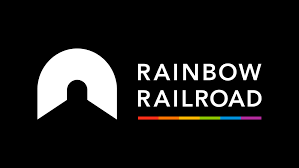Rainbow Railroad’s primary goal is to assist LGBTQI+ individuals to move to safer locations as quickly as possible, and the individuals seeking our assistance must be centered in all aspects of this work. This requires a multifaceted approach that involves identifying and creating new opportunities for mobility while refining existing pathways to safety. While we continue to provide emergency travel to safer countries, we are committed to exploring new and innovative ways to expand transit country engagement and routes to safety.
UNDERSTANDING OUR WORK
THE APPROACH WE TAKE TO OUR WORK IS V-I-T-A-L
WE VERIFY. We thoroughly verify and identify each case through interviews, documentary evidence, and supporting testimony to learn about the circumstances of the individual facing persecution and to determine how we can help. We always apply a queer- sensitive, trauma-informed, survivor-centered approach in our verification process. Our team has unique expertise that allows for verification in a way that is not only robust and systematic, but also tailored to the complexities of LGBTQI+ experiences of persecution. We do this in collaboration and partnership with Human Rights Defenders on the ground, mindful of the security risks for field operations in countries that criminalize same-sex intimacy.
WE INITIATE. Once we verify a case, we work with individuals at risk to identify the best outcome for safety. Through our comprehensive case management process, we research possible routes to safety and connect with local contacts who provide logistical support. This includes providing support to the individual in-country, through safehouses, shelter assistance, cash assistance, and complementary forms of support.
WE TRAVEL. Once a safe route has been identified, we facilitate travel. This is often to a country that accepts refugees and upholds the human rights of LGBTQI+ persons. What “safety” looks like depends on the unique individual’s needs — and is not limited to high-income countries. Travel may also mean relocation within the country of origin. If an individual crosses international borders, upon arrival, we provide limited, short-term support to help them settle and connect to resources in their new country.
WE ADVOCATE. Due to barriers for LGBTQI+ people seeking asylum and accessing traditional resettlement, we have needed to advocate for expanded and flexible pathways to safety for at-risk LGBTQI+ persons, working in collaboration with governments, academics, local partners, affected populations, and civil society. Advocacy has been especially necessary when there have been state crackdowns on LGBTQI+ persons that require an immediate response from the Government.
WE LEARN. It is important that we continue to learn, as the only organization of this size and scope engaged in this type of work. We monitor and evaluate our programs to enhance service delivery and impact, implementing insights gained from LGBTQI+ people at risk into concrete action. We also serve as thought leaders, sharing emerging trends, recommendations, and situational analyses with the global humanitarian community, governments, and grassroots actors to fill the gaps in knowledge regarding LGBTQI+ forced displacement and to generate new protection solutions.
FLEEING FEAR: FROM PERIL TO PROMISE, A JOURNEY TO SAFETY AND NEW BEGINNINGS
If that terrified nineteen-year-old could see me now, he’d probably wonder who let this bitter, sarcasm-spewing guy steal his body. The scars from his misadventures in the Middle East — both mental and the raised welts on his back — tend to do that to a person.
Home sweet home consisted of being zip tied to our radiator with its chipping paint, and some truly creative uses for bamboo canes. Not exactly the décor you’ll find in home improvement magazines. It turns out my family’s views on interior design didn’t quite align with my ‘lifestyle choices.’ I’d scrub myself under scalding water afterwards, trying in vain to wash off the sweaty smell of fear that soaked my skin. You see, my parents believed in tough love; specifically, the kind that leaves you looking like a zebra.
I learned early that joy is dangerous territory. There was danger in each shared smile with a guy, in every soft meeting of the eyes that held a promise of what could have been. If I so much as brushed shoulders with a guy in some hallway, panic would claw at my insides. Did he think I was gay for not avoiding his shoulder? Did others?
Home wasn’t an escape either. I would spend each night navigating the minefield of my parents’ moods as if I were reading tea leaves. Would my father’s clenched grip on the newspaper turn into clenched fists pummeling into me? Would the annoyed look on my mother’s face translate into barbed comments from her venomous mouth?
They eventually found out I was gay. I have no memory of the precise moment, just of the world imploding. My father’s fists slamming into me, his face inches from mine, spittle flying as he shrieked at me for being “a disgusting pervert who went against the natural order.” I knew I had to flee.

